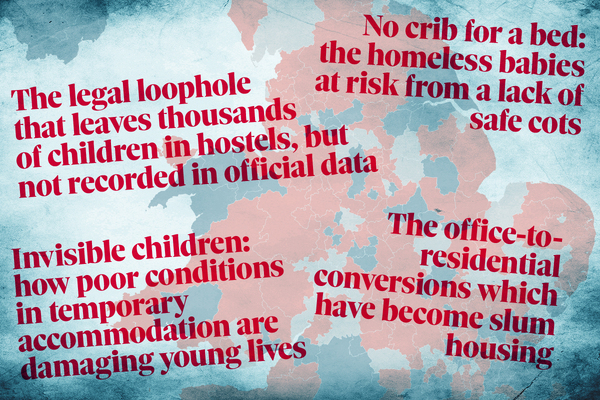You are viewing 1 of your 1 free articles
The Week in Housing: Labour’s planning proposals, first consumer standard judgements, and ombudsman’s warnings
The Week in Housing is our weekly newsletter, rounding up the most important headlines for housing professionals. Sign up below to get it direct to your inbox every Friday

Good afternoon.
It was a busy time for housing news in the first week of the new Labour government. Following the party’s landslide victory in the general election last week, the sector heard from chancellor Rachel Reeves on how prime minister Sir Keir Starmer’s target to deliver “the biggest increase in social and affordable house building in a generation” will come to fruition.
In her first speech to the Treasury, the chancellor announced plans to reintroduce mandatory local housing targets and create a taskforce to “accelerate stalled housing sites in our country”. She pledged to reform the “antiquated” planning system and said the government will be writing to councils whose local plans will need to prioritise brownfield and “grey belt” land for development.
The plans were welcomed by the sector, but some raised concerns that they do not go far enough. Fiona Fletcher-Smith, chair of the G15, said Ms Reeves’ speech “makes a start in addressing the challenges faced in delivering social and affordable homes”, but said it “falls short of providing the detail so many need”.
On Friday, providers wrote to new housing secretary Angela Rayner warning that Labour’s target of 1.5 million homes built this parliament cannot be delivered without more funding for social and affordable housing.
Councils feel the same. A group of 20 of the largest local authority landlords in England published an interim report with five recommendations on how the new government can help save the future of council housing. The group warned that unless something is done, most council landlords will “struggle to maintain their existing homes adequately or meet the huge new demands to improve them, let alone build new homes for social rent”.
Another group of concerned landlords highlighted new research on the skills shortages in the sector. Inside Housing revealed that London housing associations are facing a shortfall of 2,600 workers to deliver their asset management and development commitments over the next five years.
The London Homes Coalition – a partnership of major housing associations, contractors and specialist suppliers in the capital – has also identified a demand of 10,000 workers a year to meet their asset management commitments and a demand of up to 31,000 workers over the next five years to deliver planned new build investments.
Inside Housing has made the sector’s recruitment challenge the focus of its Housing Hires campaign.
Sir Keir selected his cabinet, and the sector once again has a new housing secretary. Hopefully, Ms Rayner will remain in post for the foreseeable future. She also retained her deputy prime minister title. Matthew Pennycook was appointed housing minister.
In (perhaps) unsurprising news, Ms Rayner scrapped the “levelling up” title from her government department, saying “no more government by gimmick”.
Kemi Badenoch was appointed shadow housing secretary. The Conservative MP for North West Essex had been serving as business secretary before the party lost power during the general election.
The new prime minister was praised after he met with regional mayors to discuss a “major programme of devolution”. At another event in the commons celebrating its 50th anniversary, the Northern Housing Consortium called for a “renewed partnership” between the government and social housing sector.
Inside Housing spoke to the North East Housing Partnership about devolution. The group of landlords set out its plans for regeneration, development, net zero, employability, social inclusion, health, care and homelessness.
This week, the Regulator of Social Housing (RSH) revealed the first judgements for the new consumer standards, following its expanded remit which came into force in April. Four landlords – Bristol City Council, Guildford Borough Council, Octavia Housing and Sheffield City Council – were each given a non-compliant C3 rating, which means there are “serious failings” and they must make “significant improvements”.
On Wednesday, the Housing Ombudsman highlighted 27 social landlords over leaks failures in its latest severe maladministration report. It said lessons should be learned from the cases, some of which led to ceilings collapsing, belongings being destroyed and residents being forced out of their homes for long periods of time.
The report is part of a series providing lessons to help the sector prepare for the introduction of Awaab’s Law. However, the watchdog warned that some providers are “not ready for Awaab’s Law”, which will introduce specific timescales for repairs.
Housing ombudsman Richard Blakeway issued a letter this week, raising “urgent” concerns about window-related complaints in social housing. The letter, addressed to social landlord chief executives, highlighted a “troubling pattern” identified from the watchdog’s recent casework, where residents’ complaints about window disrepair or health and safety issues have “not always been adequately addressed by landlords”.
Both the RSH and ombudsman have set out how they will work together under their expanded duties. In a memorandum of understanding, the English regulator and watchdog agreed to seek a “complementary and compatible approach” and communicate with one another at an early stage on issues that might have implications for the other organisation.
Elsewhere, it was revealed that two landlords based in the West Midlands are in merger talks, which if agreed will result in a new 32,000-home housing association.
Wrekin Housing Group has been in discussion with Housing Plus Group over the past few months on the move, which they said will “allow us to balance keeping costs down”, while “investing more in the services we deliver, doing more to make homes energy-efficient and having a positive impact on the local economy”.
On Wednesday, the board of house builder Crest Nicholson confirmed that it is “minded to recommend unanimously” a revised takeover bid from rival Bellway. The offer totalled around £720m.
It came after Bellway confirmed in June that it had made a revised all-share offer on 7 May, which was “unanimously” rejected by Crest Nicholson’s board a week later. The offer was believed to be in the region of £650m.
It emerged that Legal & General invested £75m in Cottsway Housing Association through its private credit portfolio. Cottsway plans to use the majority of the investment to refinance existing bank debt.
Barratt Developments announced a drop in affordable completions of 28.6% in its latest trading update, as overall completions fell due to effects of “muted demand”.
House builder Vistry Group reported an 8% increase in completions for the first half of the year, as its partnerships-only model gets underway.
In Wales, house builder Anwyl Group is looking to form joint ventures and strategic partnerships with housing associations after making a loss on developments carried out via framework agreements.
Social housing proptech firm Switchee raised £5m from Octopus Ventures and AXA IM Alts. Switchee’s clients include 130 social housing providers, and the firm said the new investment would help it remain on target to have devices installed in one million UK social homes.
Liverpool City Council launched a consultation on its draft housing strategy, committing to nearly doubling the proportion of affordable homes built by 2030 as part of a £1bn building programme.
A council report revealed that Nottingham City Council has halved homelessness officers’ caseloads since the start of the year after increasing staff numbers.
Social landlords in Greater Manchester have agreed not to use the mandatory rent arrears eviction ground under plans for mayor Andy Burnham’s Good Landlord Charter.
Major house builder Redrow had a judicial review dismissed after it challenged the lawfulness of a decision for the firm to reimburse money awarded through the Building Safety Fund.
We reported that a coroner issued a prevention of future deaths report after a man fell to his death escaping a tower block fire started by an electric bike battery.
Tower Hamlets Council said it will carry out a review after the Local Government and Social Care Ombudsman discovered it had a six-month backlog for processing housing register applications.
A court date has been set for tenants and landlords over compliance with Renting Homes (Wales) Act.
Finally, experts told Inside Housing there is a risk that shared ownership “dies by neglect” under the new Labour government, and the tenure should still be a priority for increasing homeownership.
Have a good weekend.
Gráinne Cuffe, deputy news editor, Inside Housing
Say hello: grainne.cuffe@oceanmedia.co.uk
Editor’s picks: five stories you may have missed
North East social landlords make the most of devolution
London housing associations face shortfall of 2,600 skilled workers
Who is new housing secretary Angela Rayner?
Plus Dane’s top team talks regeneration, retrofit and homelessness
Sign up for our Week in Housing newsletter
Already have an account? Click here to manage your newsletters











